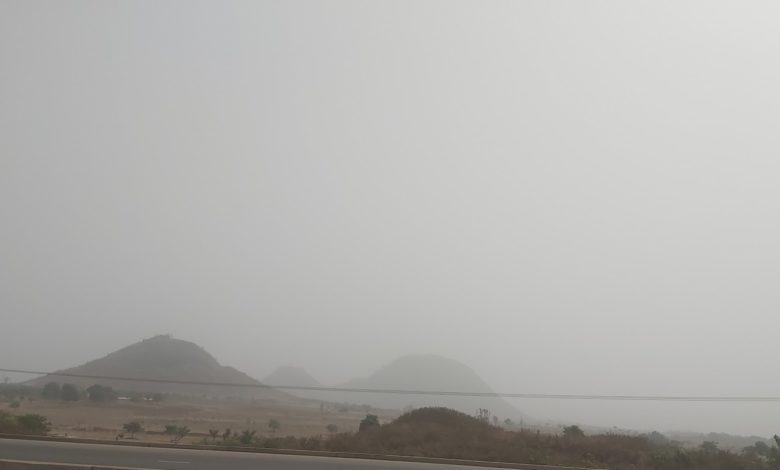Sahara Dust Blankets Nigeria, West Africa
West African countries are experiencing a dust fog across various cities.

A massive plume of dust and sand particles whipped up from the Sahara is blanketing skies across Nigeria and West Africa.
The harmattan season in Nigeria and other parts of West Africa, which occurs between November and March, is usually accompanied by dry, dusty and cold northeasterly trade winds from the Sahara Desert.
The cold temperature and atmospheric dust pollution are expected to bring about new diseases and worsen existing ones.
Habiba Ibrahim, a Resident Doctor with the University of Abuja Teaching Hospital, told HumAngle that it was a challenging period in the north due to increased allergies, asthma attacks and other respiratory issues.
HumAngle understands that air travel has been affected by the occasional poor visibility.
On Saturday, Nigeria’s Meteorological Agency forecast stated that thick dust haze conditions, with horizontal visibility of less than or equal to 1000m, are anticipated over the North and the Northcentral region throughout the forecast period.
“Dust haze conditions are expected over the inland cities of the south with a visibility range of 1-3 kilometres and localised visibility of less than 1000m throughout the forecast period.”
“Hazy conditions are anticipated over the coastal cities of the south in the morning while in the afternoon and evening hours, dust haze conditions are expected,” the agency added.
Meanwhile, on Friday, Reuters reported that dust brought by dry winds from the Sahara has settled over much of West and Central Africa, reducing visibility, choking residents in Senegal’s capital Dakar.
The paper added that Cameroon authorities have also warned that a massive plume of Saharan dust, carried by Harmattan winds, was expected to hit its three northern provinces, reducing visibility.
The Sahara dust is also expected to blanket parts of Europe. On Feb.19, the Copernicus Atmosphere Monitoring Service disclosed that its air quality forecasting systems show a substantial plume of Saharan dust travelling towards the North.
It is expected to hit parts of Europe over the weekend and early next week.
Air quality forecasts from the Copernicus Atmosphere Monitoring service also show a great plume of Sahara dust moving towards Southern and Central Europe expected to arrive this weekend.
Mark Parrington, a Senior Scientist at the Copernicus Atmosphere Monitoring Service, said, “We monitored similar events in the past weeks with significant air quality impacts in the affected regions, which were confirmed by surface measurements from the countries gathered by the European Environment Agency.
“We expect this will also be the case for the upcoming event, although it is not yet certain to what extent the plume will be visible to the naked eye,” Parrington added.
Support Our Journalism
There are millions of ordinary people affected by conflict in Africa whose stories are missing in the mainstream media. HumAngle is determined to tell those challenging and under-reported stories, hoping that the people impacted by these conflicts will find the safety and security they deserve.
To ensure that we continue to provide public service coverage, we have a small favour to ask you. We want you to be part of our journalistic endeavour by contributing a token to us.
Your donation will further promote a robust, free, and independent media.
Donate HereStay Closer To The Stories That Matter




